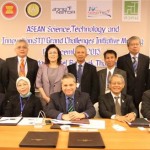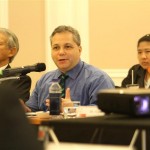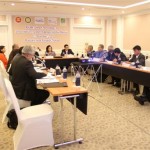Thailand organized the ASEAN Science, Technology and Innovation (STI) Grand Challenges Initiative Meeting on 13 December 2013 in Bangkok. Attending the meeting are representatives from ASEAN COST Focal Points, SCIRD Focal Points, Representatives from ASEAN Secretariat, and representatives from Grand Challenges Canada.
The idea to formulate the Grand Challenges ASEAN Program in Science, Technology & Innovation was endorsed at the 65th ASEAN Committee on Science and Technology Meeting (ASEAN COST-65) which was held in Tagaytay City, Philippines in May 2013. At this meeting Thailand proposed the Grand Challenges initiative to ASEAN which aims to support science and technology, and innovation ideas. The thinking started the concept of the Grand Challenges initiative to ASEAN.
Giving the Welcome Remark Dr. Chadamas Thuvasethakul, Executive Vice President of NSTDA indicated that the meeting will focus on identifying priority areas (which she calls enemies) that can be incorporated as Grand Challenges. Dr. Chadamas went on to say that there need to be mechanisms in place to build cooperation and act as catalyst to move the program forward.
Prof. Peter Singer, CEO of Grand Challenges Canada was invited to share his expertise and knowledge on the topic given his many years of sucessfully building the Grand Challenges Canada. “The key concept of Grand Challenges is Bold Ideas, Big Impact, and A Better World” said Prof. Peter . “The voices made by those who benefited from the Grand Challenges Canada in the past ten years have helped to increase the leverage of participation by our partners. We are glad to be given an opportunity to give advice and ideas to our ASEAN friends as they look to formulate the Grand Challenges ASEAN program. We think this is a good start as we move towards Grand Challenges 2.0 in 2014”. Prof. Peter went on to say that Grand Challenges Canada has already invested USD 7.9 million in 21 projects in ASEAN in the past 10 years. Therefore he would like to recommend that Grand Challenges ASEAN build on existing programs already taking place by the Grand Challenges Canada. The 2 programs that come to mind is development of dengue vaccine and mental health programs.
Prof. Yongyuth Yuthavong representative from Thailand also added that Grand Challenges ASEAN could also consider 2 key challenges: the first is to remove ASEAN hazardous such as haze and cross border illness, and the second is Building ASEAN Future in areas related to child development, aging, and growth. Prof. Yongyuth agrees with Peter’s idea of linking to existing programs already in place and also added the need for monitoring and measuring of program success.
The National Science and Technology Development Agency (NSTDA) and Thailand’s National Science Technology and Innovation Policy office (STI) were the local host of this meeting with support from Grand Challenges Canada and ASEAN Science Funds (ASF).


